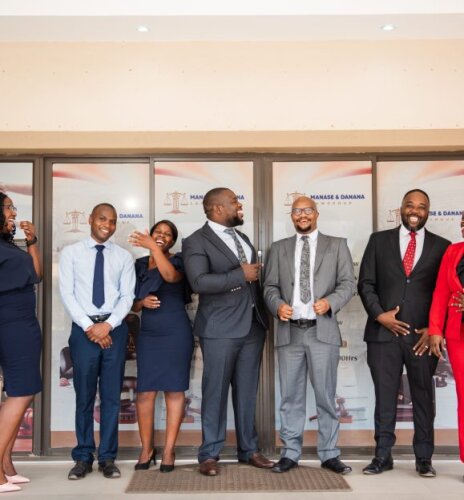Best Brain Injury Lawyers in Harare
Share your needs with us, get contacted by law firms.
Free. Takes 2 min.
List of the best lawyers in Harare, Zimbabwe
About Brain Injury Law in Harare, Zimbabwe
Brain injuries can have profound consequences on individuals and families, leading to debilitating physical, cognitive, and emotional challenges. In Harare, Zimbabwe, brain injuries stem from various causes, including road traffic accidents, medical negligence, assaults, and industrial accidents. Navigating the legal landscape surrounding brain injuries involves understanding personal injury law, liability, and compensation claims. Seeking professional legal advice is crucial for individuals and families affected by brain injuries to ensure they receive the support and compensation they deserve.
Why You May Need a Lawyer
Individuals affected by brain injuries often face complicated legal hurdles when seeking compensation for their injuries. A lawyer specializing in brain injury law can provide assistance in the following situations:
- Assessing the merits of your case and determining liability.
- Negotiating with insurance companies for a fair compensation package.
- Filing legal claims against negligent parties such as drivers, employers, or medical practitioners.
- Representing you in court if a settlement cannot be reached amicably.
- Ensuring all legal documentation is correctly prepared and submitted within statutory deadlines.
Local Laws Overview
In Zimbabwe, the legal framework for brain injury claims primarily falls under personal injury and tort law. Key aspects relevant to brain injury claims include:
- Negligence: Proving that the injury resulted from another party's negligence is crucial for a successful claim.
- Damages: Claimants can seek compensation for medical expenses, loss of income, pain and suffering, and future care needs.
- Statute of Limitations: There are time limits within which you must file your claim. Missing these deadlines can jeopardize your case.
- Insurance Claims: Handling insurance claims requires an understanding of policies and negotiating skills to maximize compensation.
- Medical Evidence: Comprehensive medical documentation is required to substantiate the extent of the injury and its impact on the victim's life.
Frequently Asked Questions
What constitutes a brain injury under Zimbabwean law?
A brain injury includes any damage to the brain resulting from traumatic or non-traumatic events, affecting a person's ability to function normally. Legal recognition often depends on medical documentation.
How do I prove negligence in a brain injury case?
Proving negligence requires establishing that another party owed you a duty of care, breached that duty, and caused your injury as a result. This typically involves collecting evidence such as witness statements, police reports, and medical records.
Can I claim compensation for emotional distress?
Yes, emotional distress can be compensated, but it must be demonstrated with clear evidence of the impact the brain injury has had on the victim's mental well-being.
How long do brain injury claims usually take?
The duration of brain injury claims varies. Simple cases may take a few months, while complex cases, possibly involving court proceedings, could take several years.
What if the injury occurred at work?
If a brain injury is work-related, victims may claim compensation under Zimbabwe's worker’s compensation laws, which necessitates following specific procedures.
Do I need a lawyer for a brain injury claim?
While not legally required, having a lawyer is highly beneficial in navigating the complexities of a brain injury claim, ensuring better outcomes.
What type of compensation can I receive?
Potential compensation includes coverage for medical expenses, rehabilitation costs, lost earnings, and damages for pain and suffering.
Can I file a claim if the injury happened several years ago?
Possibly, depending on the circumstances. However, the statute of limitations may apply, so it's crucial to consult a lawyer to explore your options.
How does comparative negligence affect my case?
If you're partially at fault for the injury, any compensation you receive may be reduced in proportion to your share of the blame.
What happens if the responsible party is uninsured?
You might still recover compensation through other avenues such as personal insurance policies or alternative legal remedies. Consult a lawyer to learn more.
Additional Resources
In Zimbabwe, several resources can assist individuals seeking legal advice for brain injuries:
- Zimbabwe Association of Neurological Surgeons: Provides information and supports those with neurological conditions.
- Legal Aid Directorate: Offers legal aid services for those unable to afford private legal counsel.
- Traffic Safety Council of Zimbabwe: Offers resources and support regarding road safety and accident prevention.
- Non-Governmental Organizations (NGOs): Some NGOs provide support and advocacy for individuals suffering from brain injuries.
Next Steps
If you or a loved one is suffering from a brain injury and require legal assistance in Harare, Zimbabwe, consider the following steps:
- Gather Documentation: Collect all relevant medical records, police reports, and witness statements related to the injury.
- Consult a Lawyer: Find a lawyer specializing in personal injury or brain injury claims to gain professional guidance.
- Understand Your Rights: Familiarize yourself with the legal rights and processes to make informed decisions.
- File a Claim: Work with your lawyer to file a claim within the legal timeframe.
- Prepare for Possible Litigation: Ensure you are mentally and financially prepared for the possibility of litigation, as some cases may go to court.
Remember, taking prompt action is crucial to securing the best possible outcome in a brain injury case.
Lawzana helps you find the best lawyers and law firms in Harare through a curated and pre-screened list of qualified legal professionals. Our platform offers rankings and detailed profiles of attorneys and law firms, allowing you to compare based on practice areas, including Brain Injury, experience, and client feedback.
Each profile includes a description of the firm's areas of practice, client reviews, team members and partners, year of establishment, spoken languages, office locations, contact information, social media presence, and any published articles or resources. Most firms on our platform speak English and are experienced in both local and international legal matters.
Get a quote from top-rated law firms in Harare, Zimbabwe — quickly, securely, and without unnecessary hassle.
Disclaimer:
The information provided on this page is for general informational purposes only and does not constitute legal advice. While we strive to ensure the accuracy and relevance of the content, legal information may change over time, and interpretations of the law can vary. You should always consult with a qualified legal professional for advice specific to your situation.
We disclaim all liability for actions taken or not taken based on the content of this page. If you believe any information is incorrect or outdated, please contact us, and we will review and update it where appropriate.










